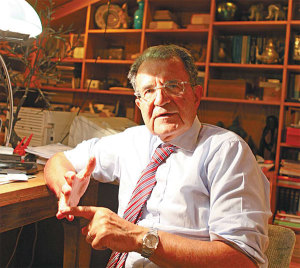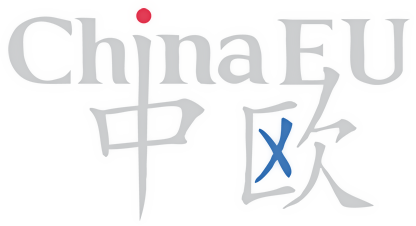Prodi sets out his vision for China
Veteran European politician speaks to China Daily as Premier Li Keqiang prepares to visit Europe
Former Italian prime minister Romano Prodi says Europe offers much “easier access” than the United States for China’s efforts to continue to grow its international influence.
“After desperately attracting foreign inward investment in the 1970s and 1980s, China is now in the right position to invest globally, and to grow its international competitiveness,” says the 75-year-old politician.

Former Italian prime minister Romano Prodi says Premier Li Keqiang’s visit to Europe will provide a significant boost for Chinese activity in Europe. Fu Jing / China Daily
Talking from his comfortable, loft-style apartment in a quiet, historic part of Bologna, northern Italy, Prodi says he has closely observed China for decades with “special affection”.
He first visited the country in the 1980s, when he says he felt the enormous drive and energy as it dragged itself out of poverty.
During his presidency of the European Commission, from 1999-2005, he made great efforts to lift Brussels’ arms embargo against Beijing and to grant Beijing market economy status but he failed because of a failure to get other EU states to agree. China joined the World Trade Organization after 15 years of negotiations. According to the terms of China’s accession to the WTO, it will automatically get full market economy status by next year, and Prodi says he continues to push to ensure that happens.
“If Brussels doesn’t do this before 2016, it will be stupid,” he says, smiling.
Its current non-market economy status means other countries can still impose additional duties on China’s products until then.
Since retiring from his second term as Italian prime minister – he served from May 1996 to October 1998, then again from May 2006 to May 2008 – the former professor of economics and international adviser to Goldman Sachs has devoted nearly a month a year to teaching economics in China at the China Europe International Business School in Beijing and Shanghai.
He says as China moves into the higher levels of global economic development, it is “a must” that it continue to invest overseas to absorb as much of the world’s advanced technologies as it can.
“But it must act very quickly as other countries such as South Korea and Japan have already done so very successfully.”
He says Europe and the US should be natural destinations of that investment expansion, he says, but the US continues to have what he calls a hostile policy toward China’s growing global presence, which extends to preventing it from buying medium-sized companies because of “strategic and state security considerations”.
On the other hand, “Europe has very easy-going policies and in addition is still in deep difficulties, which are forcing it to sell its assets or technology at lower prices” – presenting excellent opportunities for China.
Chinese Premier Li Keqiang is visiting Germany, Russia, Italy and the UN Food and Agricultural Organization headquarters on Oct 9-15, and attending the 10th Asia-Europe Meeting summit in Milan from Oct 16 to 17, and Prodi says the visit will prove a significant boost for Chinese activity in Europe.
He says the continent offers China “various choices”.
For example, Italy and Germany are strong in manufacturing and machinery, which can help China strengthen its industrial capabilities, he says.
The UK has done well in electronics, while Central and Eastern Europe offer China considerable infrastructure investment opportunities.
Identifying potential acquisition targets, he emphasizes China should also be looking to restructure its “global presence” by relocating factories, laboratories and innovation centers to Europe.
The veteran European politician, who has been honored by many universities around the world, including in China, highlights how essential it is for Beijing to forge further ties with European universities, which are especially strong in research.
“So Europe offers a multiple menu for Chinese businesses, but still internationalization is an indispensable ingredient if the country is determined to build on its successes so far.”
He says China’s investment overseas is now of “equal strategic significance” to its efforts at attracting foreign investment in the early 1980s, which played such a vital role in kick-starting its dramatic economic progress.
Prodi concedes that Europe is “in a very difficult period of time, without a common policy”.
“Tensions are at their highest point, and growth is disappointing, around zero.”
It was during his five-year presidency of the European Commission – he was its 10th commissioner – that the euro was launched, at a time of rapid expansion for the trading bloc.
But a decade on, he says Europe’s problems are deeply rooted in “not having a common policy or better coordination”.
“We had different approaches then, but now the conflicts within the EU are more obvious.”
Those conflicts largely involve solving common economic problems using different fiscal and monetary policies, but the continent’s debt crisis, he maintains, started in the United States.
During the crisis of 2007-08, the US was able to inject about $800 billion and China about $500 billion to stimulate their economies. But in the European Union, under pressure from Germany, countries had to rely on austerity measures.
“I don’t see any signs yet that those tensions will be solved soon,” Prodi says.
There are other issues, too, on his mind that he says have to be sorted out.
For instance, recently France threw down the gauntlet to its EU partners with a 2015 budget that set out how it would bring its borrowing back to within EU limits – a mandated threshold of 3 percent – two years later than promised, a retreat it blamed on a fragile economy.
That Paris announcement came hours after news that Italy also planned to ease the pace of painful deficit reduction to try to counter another year of recession.
Countries such as Italy that are facing deflation challenges also want to make the euro weaker to stimulate exports and tourism and create jobs.
Asked whether the signs are strong that the European debt crisis is nearly over, Prodi pauses, before saying: “We have stopped any euro exits, which in a way indicates the crisis is over.”
But socially, he says, many Europeans, especially the young, are still suffering.
“Due to stagnant economic growth, in many countries one out of every two young people cannot find a job – so in this way, we are still in crisis.”
Prodi expects the European Commissioner-elect Jean-Claude Juncker, the former prime minister of Luxembourg, who succeeds Jose Manuel Barroso in November, will introduce radical programs to stimulate the European economy.
Before his election, Juncker outlined plans for a 300 billion euro ($379 billion) public-private investment program to create jobs for the young and stimulate growth over the next three years.
But compared with the amounts in the US and China, “an annual injection of 100 billion euros is obviously not enough”, Prodi says.
In light of the Ukraine crisis, Prodi says Juncker should also focus on developing a common energy policy to launch big projects to allow gas pipelines and electricity grids to be better connected between European countries.
However, despite the problems, Prodi still thinks of Europe as “the world’s No 1” in terms of economic output, exports and industrial production.
He is equally upbeat about China’s prospects.
“I am fascinated by China’s development. This country has been exporting capital, technology and human resources globally in such a peaceful and massive way,” he adds, “the extent of which has never been seen before.”
Prodi says he has lived a quiet life since retiring, but still enjoys regular travel worldwide, which keeps him aware of the global political changes still being faced.
He says he has devoted much of his energy and time to helping Africa shake off poverty, for instance, and to teaching.
“From that I have seen how China’s youth has become more confident, which is nice,” Prodi says, but adding that he always warns against “overconfidence”.
For a statesman of international standing, his study, crammed with papers and books, is remarkably modest.
Even when he worked as prime minister and European head, he still tried to gather his family around him at home as often as he could, he says.
He and his wife now live on the second floor of his home, with his sister on the first floor, with a shared garage on the ground floor.
The eighth of nine siblings, seven of whom are university professors, he says he came from a “moderate family”.
“I have always felt proud of my parents, who made a lot of sacrifice to nurture an intellectual and competitive environment among us,” he says.
“Growing up in Italy, the only way to climb higher up the social ladder was education, education and education.”
Liu Jia in Brussels contributed to this story.
fujing@chinadaily.com.cn
(China Daily European Weekly 10/10/2014 page32)

